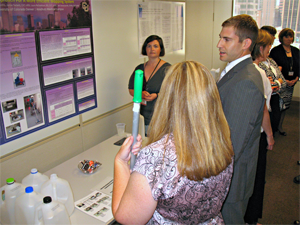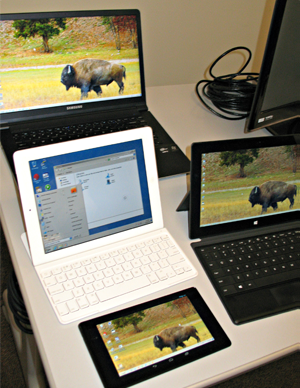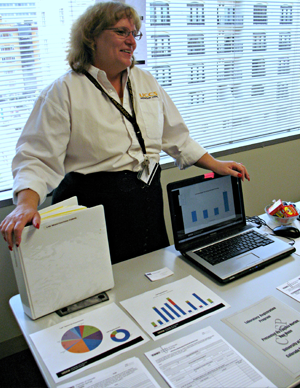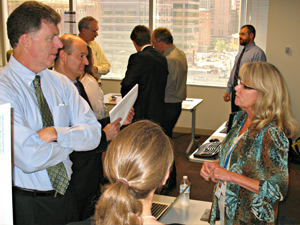On-the-job problem solving recognized at University of Colorado
CU administrators recently recognized several employees across the system who drew on experience and imagination to generate new ways of working smarter and faster at their campuses.
CU Shared Practices (CUSP) is a recognition program aimed at encouraging, recognizing and rewarding new ideas and processes that provide positive changes – fiscal and otherwise – on job performance. An initiative of the Office of University Controller, CUSP takes inspiration from the work of the President’s Task Force on Efficiency, established by President Bruce D. Benson as a means of encouraging smarter business practices.
From 12 successful submissions to this year’s contest, seven entries from individuals or teams received cash awards and presented their work at a recognition event Friday at CU system administration offices in Denver.
Research personnel from the CU Anschutz Medical Campus discussed their laboratory mopping system evaluation.
Grand Prize, $1,500:
The Laboratory Mopping System Evaluation Team, Jori Lesczynski, Michelle Wallace, Jamie Tackett and Laura Richardson, University of Colorado Denver – Research personnel responsible for the vivarium at the CU Anschutz Medical Campus recognized that the chemicals and labor required to clean the vivarium were becoming quite costly. They took it upon themselves to conduct a scientific analysis of the entire cleaning operation and the associated costs and environmental impacts. Using what they learned, they were able to conduct a comparative analysis of alternative cleaning systems, and chose a new system that has saved the university 3,900 hours of labor (roughly equal to $108,000), 619 gallons of chemicals (or about $8,366), and 40,794 gallons of water per year.
Three $1,000 awards were issued for the following submissions:
| Creating a Virtual Desktop Environment, Robert Dixon, CU-Boulder – Dixon is the Information Technology Director for Housing and Dining Services on the Boulder campus. For this large department of more than 600 employees, IT maintains 177 databases, including 25 critical business database systems, using 500 computers, 200 laptops and 100 tablets. Over the last three years, Housing IT built and deployed a Virtual Desktop infrastructure, replacing almost all of the computers with a virtual desktop client that consists of a 2-inch, solid-state box. By running only one version of the software, it has eliminated the need for support staff fixing and replacing PCs. It allows department staff to be mobile, using a tablet or laptop to access large, powerful system databases. Deploying this virtualized desktop environment has resulted in significant energy savings, reduced time and number of personnel required for IT administration, and lower equipment costs. | |
| Video-based Training, David Nicoll and Joshua Firestone, CU-Boulder – Employees of the College of Arts and Sciences Financial Services Center, Nicoll and Firestone recognized the need for more efficient and effective training delivery for staff. Because personnel are constantly shifting, and because of the difficulties inherent in scheduling classes that everyone can attend at one time, they decided to create a training video that would be available to all employees online, and could be accessed at employees’ convenience. By using this low-cost technology to deliver training to their employees, these individuals are able to provide better service to their departments, better utilize their time and the trainees’ time, and continuously update and improve the video. | |
| Process Mapping, Kathy Illian and Leah Lleras, CU Anschutz Medical Campus – These employees of the Department of Neurology also recognized training deficiencies within their department, especially when employee turnover led to lost institutional knowledge. So they created color-coded maps and diagrams illustrating the steps involved in each critical work process of their department, including diagrams to illustrate how those processes flow. They have found that these highly visual maps lessen the learning curve for new employees and provide a more effective means of conveying information. These maps are reviewed on an ongoing basis, so that process changes and/or improvements may be incorporated into the diagrams. The process maps are living documents of the work done by their department and serve to preserve the institutional knowledge that is so often lost when employees leave or are transferred. |
Three $500 awards are going to these submissions:
Online Capstone Scheduling Form, Eric Howell, CU Denver – Conceived and designed by Howell, an IT technician at the School of Public Affairs, this online form allows students to schedule their capstone presentations online and to reserve any media equipment required for these presentations. The online process has improved the capstone scheduling process by eliminating the completion and processing of paperwork. It also allows for better coordination of time and resources.
Research Administrators Meetings, Carolyn James, CU-Boulder – James initiated informal peer group meetings for discussion of timely issues relevant to administering sponsored research projects and contracts. Meetings often include a panel discussion with experts internal and external to the group. Members are able to share best practices and discuss how they go about work in their home units. The RAM member email list is available 24/7 for consultation and advice. The need for expert administration of sponsored projects and awards is paramount, and the ongoing activities and contributions of RAM help increase the level of professionalism within the ranks of research administration.
School of Medicine Administrative Professional Development Toolbox, Cheryl Welch, Madeline Sembrat, Lisa Stanford, Chris Scanlan, Peggy McIntosh and Terri Carrothers, CU Anschutz Medical Campus – Like Research Administrators Meetings, this submission addresses the need for ongoing discussion and improved consistency of practice. The toolbox was conceived by a group that identified knowledge deficits throughout the campus in the areas of HR hiring, salary setting, multiple components of pay, finance, procurement, contracting, sensitive expenditures, School of Medicine policies, ICR policies and fiscal reporting, among others. To counteract this, they developed this monthly training program in which they present topics that are timely, important and help to address these knowledge deficits. The goal is to increase knowledge, reduce mistakes, enhance fiscal compliance and provide employees with the tools to do their jobs better.
For more on these shared practices and CUSP, please visit http://www.cu.edu/controller/initiatives/cusp/





